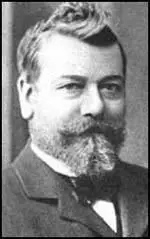Enoch Edwards

Enoch Edwards, the son of a coal-miner, was born in Staffordshire on 10th April, 1852. He was educated briefly at a Primitive Methodist day school. At the age of nine he began work at a local coal mine. A deeply religious man he taught at a Sunday school which had a small library attached to it.
Edwards joined the local lodge of the North Staffordshire Miners' Association in 1870. As one of the few men who could read and write, Edwards was given the job of lodge treasurer. In 1875 he became a checkweighman. In 1877 he was elected general secretary, a position that he held for thirty-five years.
In the summer of 1888 the price of coal began to rise. All over Britain miners began to talk about the need for a pay increase. When colliery owners rejected the claims of the Yorkshire Miners' Association, Ben Pickard, sent out a circular inviting all miners "to attend a conference for the purpose of considering the best means of securing a 10% advance in wages and of trying to find common ground for action." The Conference took place in Derby on 29th October, 1888 where the formation of a new national union was discussed but no agreement was reached.
Ben Pickard called another conference in Newport on 26th November 1889. Pickard selected Newport as it was fiftieth anniversary of the Chartist Newport Uprising. Those attending included James Keir Hardie, Thomas Burt, Herbert Smith, Sam Woods and Thomas Ashton. At the conference it was decided to form the Miners' Federation of Great Britain and Pickard was elected as its first president. Edwards was appointed treasurer.
Edwards was elected president of the organisation in 1904, replacing Ben Pickard. A former fellow miner, Robert Smillie, believed that Edwards contributed greatly to the successful growth of the trade union movement. He argued, "more than anyone else living today, or anyone connected or who has been connected with the Federation, is due the fact that the miners have been for some time now, absolutely solidly organised together in one body".
His biographer, John Benson, has pointed out: "Edwards was active socially and politically at local, regional, and national levels. He was a Primitive Methodist preacher, a member of the Ancient Order of Foresters, and district secretary of the Ancient Order of Shepherds. He was a member of Burslem school board (1886–95), a member, alderman, and mayor (1899–1900) of Burslem town council, a member of Staffordshire county council, a JP for Burslem (and later Stoke-on-Trent), and a member of the royal commission on mines which reported in 1909."
Edwards won Hanley for the Liberal Party in the 1906 General Election. However, in the 1910 General Election he switched to the Labour Party. Enoch Edwards held the seat until his death in Southport on 28th June 1912.
